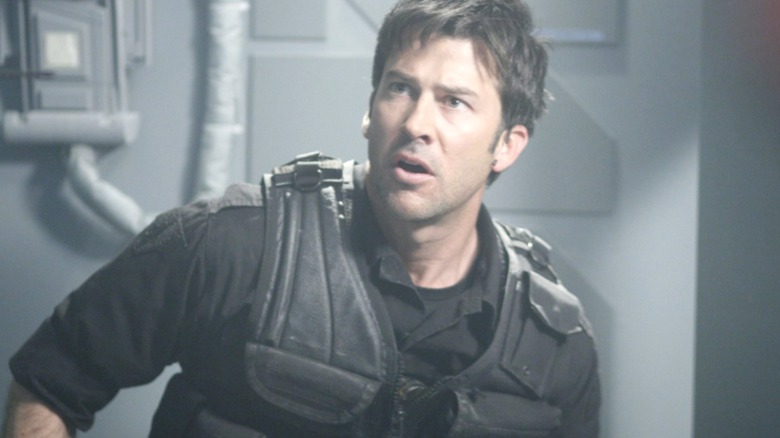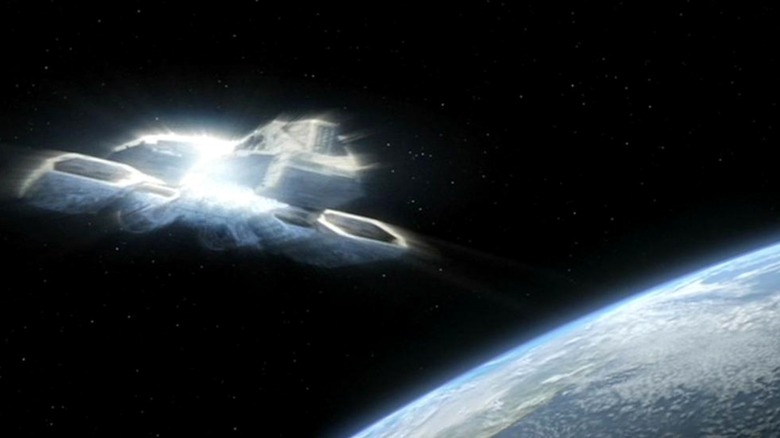A Beloved Stargate Atlantis Episode Originally Had A Radically Different Premise
Stargate Atlantis boasts some great episodes over its five-season run, but "The Daedalus Variation" emerges as a truly special one. Here's a quick refresher about the show's premise: "Stargate Atlantis" picks up right after the "Lost City" episode of "Stargate SG-1," and revolves around fresh revelations about the underwater city of Atlantis. The presence of a brand new crew and mission statement was enough to make "Stargate Atlantis" stand out, but the show goes out of its way to cement its own franchise identity. As a result, the best episodes are ones that keep you on your toes, pulling you in with characters that are brilliantly fleshed out at every turn. Here, nothing can be taken for granted, as the show does a very good job of creating (and sustaining) raw tension, where the lives of even the most beloved characters genuinely appear to be in peril.
Let's circle back to "The Daedalus Variation," in which the Atlantis expedition accidentally stumbles upon the USS Daedalus, an interstellar capital ship that primarily ferries equipment between Earth and Atlantis. The problem, however, is that the ship looks abandoned and appears out of nowhere, which is odd considering that the Daedalus is supposed to have been Earth-bound for quite some time. After Lt. John Sheppard (Joe Flanigan) deploys a team for an onboard investigation, the Stargate Command informs them that the actual Daedalus is currently two days away from Earth. Initially suspecting this mysterious craft to be a duplicate, Sheppard and co. realize that something more inexplicable is afoot after they step inside the freezing ship that exhibits signs of aggressive battle.
Those who've watched "Stargate SG-1" might've already figured out that this anomalous spaceship is the Daedalus from an alternate reality (!), a rather common occurrence in a franchise that promises whimsical possibilities. To make matters worse, the crew ends up being transported to this unknown reality and must find a way back to the primary one before it is too late. The fact that "Atlantis" wasn't afraid to embrace alternate reality shenanigans was a great sign, and this instinct has paid off in more ways than one ever since. However, this memorable episode was very, very different when it was first conceived, as no ghost Daedaluses were a part of that version. What was this initial idea like?
One of the best Stargate Atlantis episodes began with an intriguing idea
"Atlantis" writer Alan McCullough spoke at length with Gateworld about the initial ideas for "The Daedalus Variations," and how the premise kept evolving until it bloomed into the episode we know and love:
"This is a testament to people not giving up on a story. I pitched that story, and when I originally pitched it, I had pitched it as a room in Atlantis. They discover a room in Atlantis that then travels you into alternate universes. But of course, the obvious problem then was what happens when you transport into a universe where Atlantis doesn't exist? It didn't make sense — but everyone [in the writers' room] loved the idea that we had discovered an Ancient device that could do this."
The Ancient device in question is the alternate reality drive, which was developed by Dr. Rodney McKay (David Hewlett) in an alternate reality. The drive's purpose is to transport matter and access alternate realities; its radioactive nature prompts caution, which is why it can always be found encased in a protective area of the ship. In this episode, the crew discovers dead versions of their alternate selves along with the alternate reality drive, which introduces a bleak and existential thread in the midst of a thrilling space adventure.
Anyway, McCullough and co. kept brainstorming ideas until they decided that a ship would be the best vehicle (no pun intended) to introduce the alternate reality trope, as this "immediately wipes out all the inconsistencies" that come with the boxed room idea. Once Daedalus was decided upon, everything else started falling into place, including the introduction of a new alien species, which could've been integral to the series later on had "Stargate Atlantis" not been canceled after five seasons. As McCullough explained:
"I don't think we spent a lot of time coming up with who or why those aliens existed. ... But I will say that we liked that character design a lot, and I can say that, if we had done future seasons, I think there were plans to revisit those aliens. It was just a short, tiny part of that episode — so we didn't want to spend tons of money on ... visual effects or anything like that. But we loved it so much. We liked the way they looked, and we thought it would be nice to bring those guys back. And then we never got that chance."
You know what, I really liked those aliens too, but the franchise had unfortunately moved on to newer projects by then, before coming to a grinding halt in 2011. That said, we can always revisit "Stargate Atlantis" and appreciate the fact that it still makes for great television in spite of its flaws.

